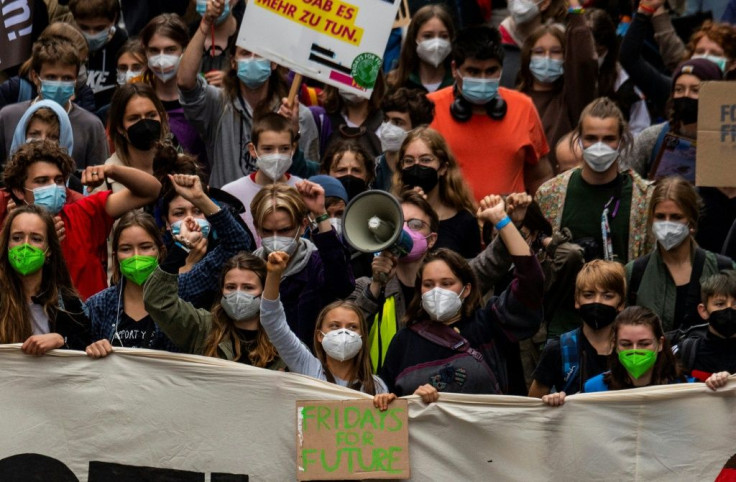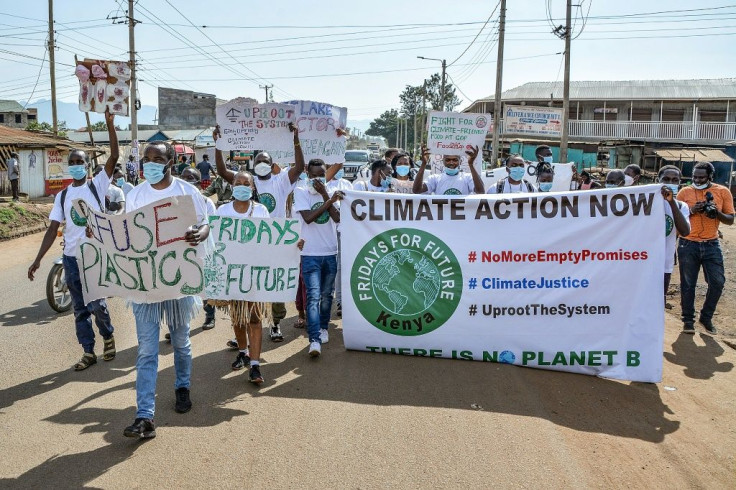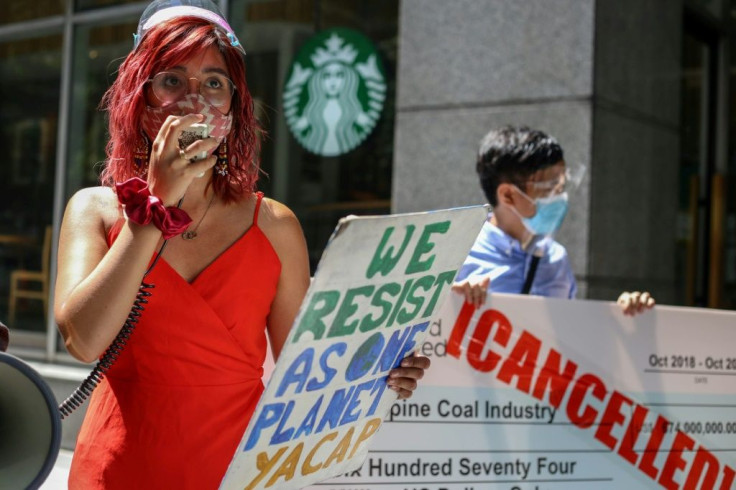'Left Behind': Climate Activists Fight For Inclusive COP26
The Covid-19 pandemic offered young climate activists from Africa, Asia and South America a unique opportunity to connect online with their counterparts in the West and have their voices heard.
But now many are worried the pandemic may keep them from attending crucial climate talks in Glasgow, where they hope to push world leaders on issues facing poor countries on the frontlines of climate change.
Flooding, fires and extreme heat are just a few of the climate-change induced catastrophes that experts say will more adversely affect communities in lower-income countries as the planet steadily heats up.
Activists from those countries fear that without their presence, their voices will be ignored at the upcoming COP26 summit opening on October 31.
"We're only going to be left behind again," said Mitzi Jonelle Tan, a climate activist in the Philippines.
"We need leaders to hear our stories, they don't know what it's like to be afraid for your life because of floods," the 23-year-old told AFP from Marikina city, regularly hit by typhoons made more powerful by rising seas.
Tan is one of several climate activists AFP has been following in the lead-up to COP26, billed as humanity's last chance to avoid catastrophic global warming.

She will be going to COP26, but many will be not, hampered by a lack of access to vaccines, travel restrictions and limited funding.
Like hordes of other activists from the so-called global south -- less industrialised, lower-income nations -- Tan has linked up with Greta Thunberg's Fridays For Future movement that has inspired massive street protests around the world.
But as the pandemic swept the globe, activists were forced off the streets.
They connected online, carving out a space for activists from lower-income countries to have their concerns heard.
"In online spaces, the distances between the global north and the global south become less relevant," said Joost de Moor, an assistant professor at Sciences Po university in Paris.

Some created the Most Affected Peoples and Areas (MAPA) group within Fridays For Future, pushing for the climate crisis to be linked with other "systemic injustices" related to class, gender, race or disability.
"When we started, we just wanted a group chat to talk and feel safe with one another," Tan said of the group, which started on WhatsApp.
It blossomed. Around 10 two-hour long calls were organised between activists across hemispheres.
They exchanged experiences and points of view, an opportunity to talk about the impact of climate change in lower-income countries.
"For young environmentalists in the global south, climate change directly affects their quality of life, housing and their capacity to provide food for themselves," said Sarah Pickard, a researcher in youth political participation at Paris 3 University.
Another issue that emerged: sourcing the natural resources required to shift to renewable energies.

The World Bank estimates that over three billion tonnes of minerals and metals will be needed to deploy wind, solar and geothermal power necessary for the green transition.
But many companies producing these resources -- mostly operating in lower-income countries -- are accused of rights abuses.
"It's not just about reducing carbon emissions, it's also about the way it's done," Tan said.
With COP26 around the corner, many are hoping these issues will be front-and-centre.
But few will get the chance to travel to Glasgow.
"Underrepresented groups are left out, yet they are the groups who are already the most affected by the climate crisis," Nigerian climate activist Kelo Uchendu told AFP from the southern city of Enugu.
In the north of his country, droughts and desertification have pushed herders to migrate in search of forage and water to feed their cows, leading to conflict over scarce natural resources.
The 25-year-old mechanical engineering graduate hopes issues like this will be brought to the attention of the head of COP26, Alok Sharma.
He has helped collect activists' input to local COPs (Conference of the Parties) across Africa to be handed to Sharma at the meeting.
But he might not be the one to do it. He has only secured partial funding to travel, and has not yet received his Covid-19 jab.
Having a global voice extends beyond the COP26 summit for Kenyan activist Kevin Mtai.
Without international support, local projects can be tough to implement.
"You are on your own or maybe with some volunteers," the 26-year-old said, referring to the gardening project in orphanages and schools he set up in Kenya to teach children how to plant vegetables sustainably.
But when he hosts events linked to Fridays For Future, organisations often help with funding and media coverage.
Despite the groundswell of climate awareness, optimism is tempered ahead of COP26, with many activists sceptical the high-level talks will deliver.
"We have to pay a lot of attention to what is said, but most of the work is going to come from climate activists," 25-year-old biology teacher Catalina Reyes Vargas told AFP from Colombia.
She won't be attending because she has not received a second Covid-19 jab and her country is on Britain's travel red list.
Filipina activist Tan says regardless of what happens, they won't be silenced.
"True change comes from the streets," she said.
"We have to be so loud they can't ignore us."
© Copyright AFP 2024. All rights reserved.





















